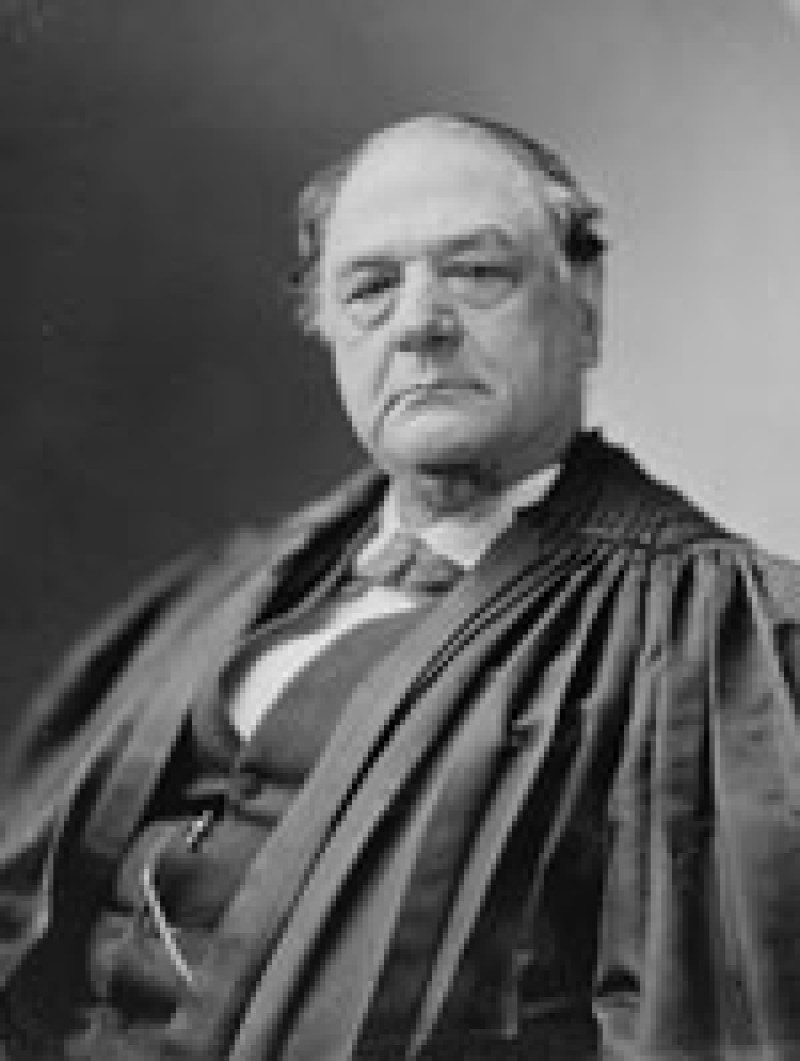Noah Haynes Swayne (Dec. 7, 1804 - June 8, 1884)
Noah Haynes Swayne, jurist, was born in Frederick County, Virginia. His parents were staunch Quakers, and Swayne's strong antislavery views may have been shaped by Quaker hostility to the practice. Swayne's plans to become a physician changed with the sudden death of his instructor. He turned to the study of law and was admitted to the bar before his 21st birthday. Choosing not to practice in Virginia, however, he moved in 1823 across the river to Ohio, a free state. There his vigorous antislavery views may have contributed to the rapid growth of his legal practice.
At the age of 22 Swayne was appointed local prosecuting attorney and was elected to the state legislature as a Jacksonian Democrat. In 1830 Andrew Jackson appointed Swayne U. S. attorney for the district of Ohio, a post that he retained for the next decade.
By the 1850s Swayne's hostility to slavery turned him toward the new Republican Party. While Swayne was serving as an aide to Republican governor William Dennison, his close friend Supreme Court Justice John McLean suddenly died in April 1861. McLean, like Swayne, had come from Ohio, and he had apparently expressed the hope that Swayne would someday take his place.
In his campaign to become jurist, Swayne pointed to his antislavery beliefs and his obvious support for both the Union and the Republican Party. He solicited support from numerous prominent politicians, including the entire Ohio congressional delegation. President Abraham Lincoln named Swayne to the high court on Jan. 22, 1862, and the Senate confirmed the president's first Supreme Court appointment two days later, with only one dissenting vote.
Swayne's almost two-decade career as a justice of the Supreme Court was mediocre at best. His only claim to distinction was his consistent support of Lincoln's war measures. In the Prize Cases (1863), he was part of the bare majority that upheld both the seizure of Confederate ships and the naval blockade of southern ports, which had been ordered by the president without congressional authorization.
As a Supreme Court justice, Swayne had little inclination to withdraw from political activity, perhaps because his generation's ideas of judicial propriety were very different from those of a later era. When Chief Justice Roger Taney died in 1864, Swayne again mounted a political campaign for promotion. He tried to block support for his fellow Ohioan Salmon Chase. Lincoln ultimately appointed Chase, and when Chase died in 1873, the 68-year-old Swayne without hesitation again sought the post.
Although by 1878 Swayne appeared to be in failing mental health, he was reluctant to leave the bench. Not until 1881, when President Rutherford B. Hayes finally promised that he would name another Ohio lawyer and Swayne's close friend Stanley Matthews to take his place, did the ailing and aged jurist resign, on Jan. 25, at the age of 77. Hayes accepted the resignation on the same day, possibly fearing that Swayne might yet change his mind. He died three years later, in New York.
Swayne's judicial career may be said to have been a monument to mediocrity. While his support of Lincoln's war measures was important, this position lost its significance over a 20-year career in constitutional law, in which his accomplishments were only adequate.
Some content and graphic elements featured on webpages related to the Thomas J. Moyer Ohio Judicial Center were used with the permission of the Ohio Historical Society; the Prints and Photographs Division of the Library of Congress; the Office of the Curator of the Supreme Court of the United States and American National Biography Online.
Biography of Noah Haynes Swayne (Dec. 7, 1804 - June 8, 1884)
Citation: Jonathan Lurie. "Swayne, Noah Haynes"; http://www.anb.org/articles/11/11-00830.html; American National Biography Online Feb. 2000. Access Date: Fri Oct 3 09:59:47 2003. Copyright © 2000 American Council of Learned Societies. Published by Oxford Univeristy Press. All Rights Reserved.
Portrait of Noah H. Swayne - Library of Congress, Prints & Photographs Division.

